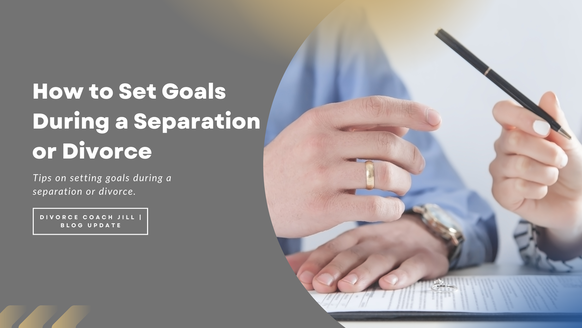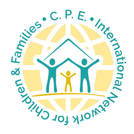|
As you go through your divorce, imagining life post-divorce can be difficult. You can get caught up in the day to day challenges and lose sight of what your life will look like after you’re legally divorced. One of the best ways to make the transition easier is to set goals for yourself. Doing so will help you focus on what's important and keep you moving forward. Here are a few tips on setting goals during a separation or divorce.
Keep your goals focused on what you want your future life to look like Give yourself some time to think about your future life - post divorce. Write down where you’d like to live, what you’d like to be doing, how you’ll spend time with your children, and anything that you can think of that will make the next chapter of your life what you want it to be. If you’re having trouble with this, enlist a friend, a therapist with expertise in divorce or a divorce coach to help you. A therapist with expertise in divorce and a divorce coach are specifically trained to provide you the space and the tools to help you determine what you want in your divorce. This step is key because you need to know what you ultimately want in your divorce in order to negotiate with your soon-to-be-ex (STBX). Too many people hire attorneys and ask their attorneys what they should fight for. Attorneys are trained in the law, not in helping people develop their divorce goals. Divorce goals to consider:
Your STBX can have different goals and that’s ok. You’ll need to compromise so that you both are able to meet your most important goals. Set your personal goals Through divorce you can experience personal growth in a profound way. Below are ideas for personal goals:
Set dating goals If you’re interested in dating post divorce, you want to make sure that you are fully healed from the ending of your marriage. You don’t want to rush into another relationship before you’re ready. Also, your children need you so you need to be able to balance taking care of your children, work and all the other responsibilities of life. A new relationship will require your time and energy. Think about these questions:
If you need support with this, consider seeing a therapist to work through all of the grief, anger, and other emotions that you've experienced. It's essential to take time for yourself and do things you enjoy, whether new hobbies, travel, or just reading a new book. Take a break before dating again and think about what a healthy relationship means to you. Once you feel like you have fully grieved and are able to have perspective about your marriage and divorce, starting to date can be a very healthy experience. Each person you meet is another opportunity to learn about what you want and how you want a new relationship to be. Achieving your goals Write down your thoughts related to your goals in a journal. As you write your thoughts, you’ll process your feelings and learn more about yourself and what you want. Then you can run it by a friend, therapist or divorce coach and refine your goals to make them specific, measurable and achievable. You want to put a time frame on each of your goals so that you can be accountable to yourself. These steps will help you develop a well thought out plan to achieve your goals for your future post-divorce life. Divorce is one of the most stressful experiences and involves complex emotional, financial and legal issues. In order to be able to think clearly through your divorce, it’s so important that you take care of your emotional self.
1. If it feels wrong, don’t do it The ability to set boundaries is crucial and can be hard, especially after separating from a long-term relationship. What do healthy boundaries look like? Not doing something that feels wrong or uncomfortable is a great starting point. If your Soon-to-be-ex (STBX) tells you to do something and you don’t feel comfortable doing it, you need to be able to let him or her know that you disagree. This doesn’t mean that you should be disrespectful, it means that you can let them know that you appreciate their perspective. But in the end, you get to decide what you want to do. 2. Stay calm when you communicate with your STBX Communication is key in any relationship, divorce included, and being calm will help you effectively communicate with your STBX. Try not to react to the emotion in the other person’s voice, this can escalate a simple conversation into an argument. Instead, recognize that you don’t have to respond right away. Take some time to breathe deeply, and think about how you want to respond. Not only will this prevent an argument, but it’s less emotionally draining on you. Lastly, if the conversation is getting escalated, remove yourself until you are both able to respond calmly. 3. Trust your instincts Your instincts are there to tell you when a boundary is being pushed too far and it’s key to listen to them. When you can feel yourself being pushed too far or being put in an uncomfortable situation, trust when that gut feeling kicks in and walk away. 4. Don’t be afraid to say “no” Sometimes we say yes because we feel intimidated or want to please others. Saying “no” helps to establish healthy boundaries and enables others to understand what to expect from you. When a situation arises, you might feel obligated to go along for the sake of agreement but if you say yes and then feel resentful, that’s not good for anyone. Learning to say no and not feel bad is key to taking care of your emotional self. 5. Let go of what you can’t control You won’t be able to control everything. There are things that may happen that are not ideal for you or your children. In most cases, everything will still turn out ok, even if it’s not exactly what you wanted. Detaching and letting go are such important skills when you’re going through divorce and will save you so much stress. If you’re struggling with this, I recommend practicing mindfulness and meditation. Caring for yourself emotionally can make a huge difference in helping you move forward through your divorce in a healthy way. When you’re able to take better care of yourself mentally and physically, your decision making will improve, you'll be able to think clearly, you’ll be able to be there for your children and you can conquer anything that comes your way! Self-sabotage. We’ve all done it. But when we do it while going through a life-changing process such as divorce and trying to come out better on the other side, it can be very problematic.
Self-sabotage can prevent you from reaching your goals, and in a divorce that can have dire consequences. Understanding why self-sabotage occurs can help stop it. People sabotage themselves because they have self-doubt and a loss of confidence, both of which happen with divorce. You may doubt that you can make good decisions because your marriage failed. You may question your ability to support yourself as your financial picture changes. You may feel like a bad parent because your children are struggling. But these thoughts are not true and you need to be able to bring yourself back to reality. How do you overcome these negative thoughts so you can face the realness of divorce confident and strong? Here are several strategies that can help: Write down your negative thoughts - Write down the negative thoughts as you’re having them. If you’re saying to yourself things like: I won’t be able to support myself and my kids. I’m not a good parent. This is going to be like this forever. We’re never going to sell our house. How do these thoughts make you feel? These negative thoughts impact the way you feel. Notice the judgment and negative assumptions. Take a deep breathe and slow down your thoughts by writing them down. Write down the answer to this question for each thought - what is the evidence that this thought isn’t true? Think of all of the times you’ve made good decisions, been financially stable and have been a good parent. That doesn’t go away. Write down facts about who you really are – as if you were talking to your friend when they're feeling bad about themselves. Ask yourself: What do I love about myself? What am I proud of? What am I good at? How far have I come? Replace it! Replace the negative thoughts with positive phrases: I am incredible. I am strong. I’ve done really incredible things. I’ve raised amazing kids. I am a force to be reckoned with. I’ve got this. You’ll be amazed how much different you feel when you change your self-talk. Self-sabotage can prevent you from moving forward in your divorce process. If you’re able to change your self-talk to be positive, you’ll be amazed at how you’ll become more confident and you’ll feel more peace and happiness in your life. Divorce can be overwhelming and isolating. Too many people have so much shame from their divorce that they don’t reach out for help. Having support during divorce is key to making the divorce process more manageable. You can learn to let go of shame and find support so that you can get your life back on track.
How do you find the support you need? Spend time with family Your family are typically the first ones who will be there for you. Not everyone in your family needs to know all of the details of your experience. Only confide in your most trusted and supportive family members as you’ll need non-judgmental people who help you feel good about yourself. Reach out to friends If you don’t have a supportive family, choose friends who are patient and kind. Your friends may not understand what you need. Reach out to friends who you can trust to share what’s going on and what you need. You may need a place to stay for a night or two to get away from the stress. Or you may need a walking partner to get out and exercise. Whatever it is you need, let your friends know. If they’re true friends, they’ll be there for you. Find a support group There are plenty of divorce support groups that you can find online, in your local area or on apps like Facebook and Meetup. Hearing stories from others and learning about their experiences will help you cope and can offer great advice on situations that neither your friends nor family will be able to help you with. They are also a great resource for referrals for therapists, divorce coaches, attorneys, or anything else that you might need as you continue your divorce. My free FB group, Separation and Divorce Support Community, is a great example of this. Talk to a professional Many people speak with an attorney first when going through divorce and because they're distraught, they end up using their attorney as a therapist. This can cost a lot of money plus attorneys are not mental health professionals so they don’t know how to help you with emotional issues. A therapist or a divorce coach can provide you with specific tools to process your emotions so that you can think clearly through the important decisions that you have to make throughout your divorce process. A divorce coach can help you understand what your options are as you go through your divorce process and can help you avoid making costly mistakes. A good support system during divorce will help you let go of the shame and shift your mindset to a more positive outlook so that you can get your life back on track. Choose your support system wisely by reaching out to supportive friends and family, joining support groups and getting the professional guidance to get to your great post-divorce life! When I was going through my divorce, I didn’t know what to say to my kids. I was doing my best to protect them so I didn’t share much with them about the divorce. I assumed they would open up to me if they needed to talk. Knowing what I do now, I would do things differently. Following are some key points to help kids open up during divorce.
1. Start things off with honest communication. How you are going to communicate with your children during divorce starts when you tell them about the divorce. It’s important to tell them together - with both parents if possible - without blaming either parent. You don’t have to give too many details, but answer their questions as they come up. Kids are focused primarily on themselves and mostly care about how the divorce will impact them. They’re typically not thinking about their parents’ feelings too much. You can give them information like:
It’s so important to be available to your kids when they want to talk. You can intentionally create situations where they’re relaxed such as when you’re driving in the car or before they go to bed. Here are some ways to encourage them to open up with you:
Kids live in the present moment - they’re much better at doing that than adults. When they don’t like what’s happening, they may say hurtful things to their parents. Try not to get caught up in the things they say during a stressful moment. They may seem extremely upset one day, but that doesn’t mean it’s how they’re going to feel the next day or next week. Do your best to let little things go and not to take it personally. As a parent, it’s devastating to know they’re hurting, but kids are very resilient. Their moods will not last forever. However, there are times that you should consider reaching out for help. There are some clues to show if your child is simply upset and processing their feelings or if they are having deeper struggles. Here are some examples:
These behavior changes are signals that your child isn’t coping well with the divorce and may need extra help from a counselor or professional. The great news is that the most stressful parts of your divorce will not last forever, and that there are clear ways to keep the lines of communication open with you and your children. Many times, parents can have even deeper relationships with their kids after divorce when the strain of the marriage isn’t a part of the parent/child relationship. In the meantime, these strategies can give you a positive direction for how to get your kids to open up. Divorce is a painful experience that can leave you feeling lost. No matter how many years you’ve been married, your identity has been impacted by being a married person. When you lose this identity, it can send you reeling. Acknowledging all the big and little losses is an important part of healing. Take some time to journal about this loss of identity and talk about it with supportive friends and family, a divorce coach or a therapist.
The next step towards healing from this loss of identity is clarifying who you are and where you’re going. When you got married, you may have lost your identity as a single person, but didn’t realize it because it happened slowly. When you’re going through divorce, you get the chance to find yourself again and learn how to be happy in an authentic way. Finding yourself is simply knowing yourself, what matters to you, and what makes you happy. One painful part of divorce is that it shakes up our lives and we aren’t sure what will be left when the dust settles. But you get to choose who and what you want to keep and what to release and leave behind in your old life. You get to rebuild your self-esteem and confidence by knowing that you’re strong enough (you are!) to come through this even more healthy and whole than you were before. One of the positives of divorce is the opportunity to find who you are and develop a future that aligns with that. Start with remembering what you enjoyed before you were married. Write down answers to the following questions:
Take some time to think about these questions. Get to know who you are, what your priorities are and how you can move forward committed to living in a way that is fulfilling to you. This journey of finding out who you are can be exciting. Do you want to take up a new sport or other hobby? Do you want to volunteer and help others? Do you want to change careers? You have the opportunity to learn and grow from your divorce and the power to live in a more authentic way. Grab this chance and just do it!! When you have children and get divorced, the final agreement must include a parenting plan to clarify what will happen after the divorce regarding the care of the children. A parenting plan outlines the parenting schedule - when each parent will see the children and the logistics of how that will happen. It also covers other relevant issues like how decisions should be made about medical situations, the children’s education and religious affiliation.
Everything that’s put into the agreement is part of a legal document, the Marital Settlement Agreement or the Separation Agreement, that’s filed with the court. Parents must follow that agreement and can be brought back to court if they don’t. A child-centered parenting plan is one where you put your children and their wellbeing first. There are many things that get in the way of putting children first like work schedules and significant others. However, when you center the plan around the needs of the children and what’s best for them, it will help create a structure for them to grow into emotionally healthy adults. Here are some key tips to keep your parenting plan child-centered:
When going through divorce, many people feel shame and/or guilt because divorce is at some point public and people feel like others are judging them that they’ve failed in their marriage. But shame and guilt are very different and while guilt can be appropriate and understandable, shame never is. There is a major difference between the feelings of shame and the feelings of guilt and there are ways to manage both.
Guilt is a feeling about something either that you’ve done or you *feel* like you’ve done. Brene Brown, a shame researcher, explains that guilt is about behavior where you say to yourself, “I did something bad.” However, Brown explains shame is much deeper and is the feeling like there is something wrong with me. Shame is a focus on one’s self rather than behavior where the person believes, “I am bad.” Because shame and guilt are quite different at their root, it’s important to determine which one you are struggling with in order to understand what to do about them. Coping with Guilt in divorce To manage your guilt in divorce, explore your feelings. What are you feeling guilty about? Talk about your feelings to friends, family, a professional or journal about them. Decide if these feelings of guilt are rational and appropriate or they are irrational and false. Rational: I took my stress out on my kids and spoke harshly to them. False: If I had done XYZ, my husband wouldn’t have left me. If you determine your guilt is rational and related to something real that you DID, then:
But, if your guilt is about something that you had no control over, but you just wish that you could have fixed it by some preventative action, that’s irrational guilt. You aren’t responsible for the actions of your ex, and you’re not responsible for every struggle your children are having because you’re getting a divorce. In these instances, work on your self-talk. Ex: “I am in control of my own responses, not the responses of others.” Coping with Shame in Divorce Shame is painful. Shame is the voice in our head that says that we are a failure, not a good person or similar negative messages directed straight at our identity. To decrease shame, we have to figure out exactly what those messages are. What is that inner voice saying? Shame may come from negative spoken or unspoken expectations and reactions from childhood. What negative messages do you say to yourself? What you think about yourself and how do you talk to yourself and view yourself? Determine where are these negative messages coming from? Was it from a parent, sibling, or some other significant adult in our life? Was it from religion's or a school's explicit or implicit messages? Or was it something else? Identify negative thoughts that get stuck on repeat. Call out those thoughts and replace them with new, positive thoughts. Write all your strengths down. Replace the cycle of negative thoughts with positive affirmations and write them down where you can see them. Surround yourself with supportive people or a therapist who can help you work through these negative core beliefs. It takes work but you can manage your guilt and shame. Like Robert Frost wrote: The only way out is through. This past year has been tough and a lot of people have lost hope for a better future. But that can change by recognizing that we’re somewhat in control of our thoughts. Did you know that we have about 6,000 thoughts per day? And about 80% of them are negative! That means that we have a huge amount of negative self-talk. We spend a lot of time telling ourselves that we’re not good enough, not smart enough, not thin enough or not as good as someone else. When we do this often, it becomes a habit. We can start feeling bad about ourselves and lose hope.
The great news is that we can change these negative habits and train our minds to interpret our experiences in a more positive way. Sure, life can be HARD, but our patterns of thinking and the way we perceive the world can make it much harder than necessary. In the words of Greek Philosopher Epictetus, “We are disturbed not by things, but by what we think about things.” Therefore, if we can change the way we think, we can change the way we feel! Have you ever expected, even visualized disaster? Have you noticed or heard about a problem and started asking, “What if?” What if tragedy strikes? What if it happens to you? That way of thinking is called “catastrophizing” where we catastrophize a problem and make it worse by escalating our negative thoughts. With catastrophizing, we worry that the worst possible outcome will happen. We exaggerate the problem. When you realize you might be catastrophizing, stop and ask yourself the question, “What story am I telling myself?” It might take a moment, but get specific. For example, maybe you are telling yourself that you are ruining your kids and that you are a terrible parent and that none of you are ever going to be happy again. Whatever it is, when you force yourself outside the thoughts and examine them, it becomes apparent how dramatic your story has become. After identifying the story you’re telling yourself, ask yourself, “What other story could be true?” This is where you use your logical brain and reference facts. An example of this would be, “Patty went through a divorce and it was so hard, but her children are all doing well and she moved on with her life and is thriving. That can happen for me, too.” When you identify the negative thoughts, and replace them with positive ones, you’ll feel better. If you think you are a good person who deserves to be happy, you’ll create a happy life. You’ll see possibilities for the future and have hope. While using these techniques takes mindfulness and work, it’s worth it as it can give you a tool to start the new year off in a great place. Setbacks, such as deep sadness or difficult days, are a normal part of getting through divorce. You may be feeling good for a while and then something triggers a strong painful feeling (like a text from your ex). Setbacks can be frustrating and can make you feel helpless. You can feel disoriented and scared about the future. You may feel exhausted, unable to sleep and anxious. You may question if you will ever feel good again.
Although it’s difficult, setbacks are an indication that you’re actually moving forward through your divorce recovery. Some setbacks are small and fleeting while others may be more intense where you don’t see an end to the pain. It’s important to address each setback as it occurs. If you avoid addressing each setback as it comes up, you can remain stuck in the pain or bitterness and it will take longer to move on. Throughout the process of tackling each setback you’ll take another step forward in your healing process. Here are 6 tools to help you tackle any obstacle that you face: 1.Recognize that you’ve entered a setback and it doesn’t mean that you’re back to square one 2.Instead of distracting yourself so you don’t think about your emotions, really focus on what you’re feeling by journaling or talking to a friend, support group or therapist 3.Start charting your sadness levels twice a day so that you track the setback 4.Make a list of what makes you feel good. Use this list to form your weekly divorce recovery plan. 5.Change your self-talk – stop yourself when you have negative thoughts and replace them with more positive thoughts. 6.Regain control – focus on what you can control and not on what you can’t. You can’t control your ex. You can't control the length of the process. Focus on your plan for your new life, your comeback and what you want in your future. If you focus on what you can control, it will help you move through your divorce with more confidence. Use the tools above and you will have an easier time facing your setbacks. These strategies will enable you to feel good again and to cherish your new life! Join our Thriving Through Divorce Online Group Coaching Program here: go.divorcecoachjill.com/thrivingprogram |
AuthorJill Barnett Kaufman, MSW, LCSW and Certified Parent Educator is an experienced clinician who helps clients discover new ways to resolve a variety of challenges and bring more happiness and peace into their lives. Archives
November 2023
Categories
All
|
|
If you are in crisis or in need of emergency assistance, please call 911. |
|












 RSS Feed
RSS Feed


